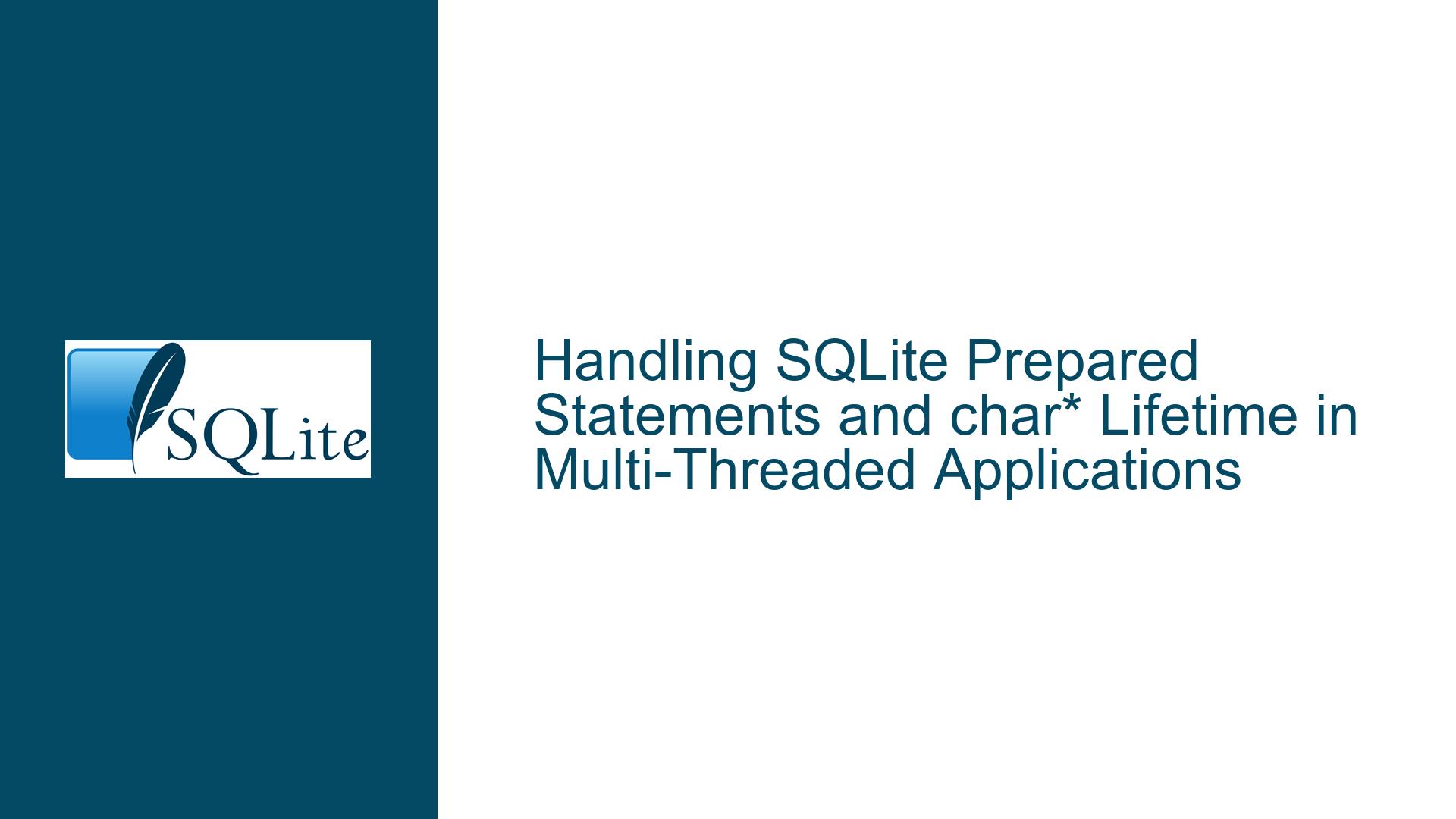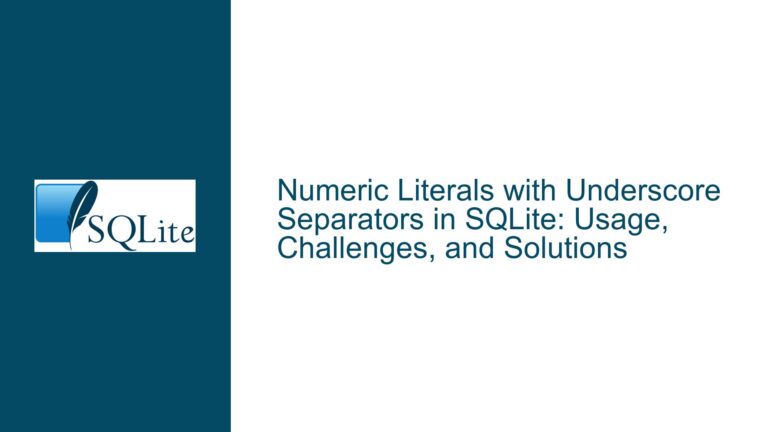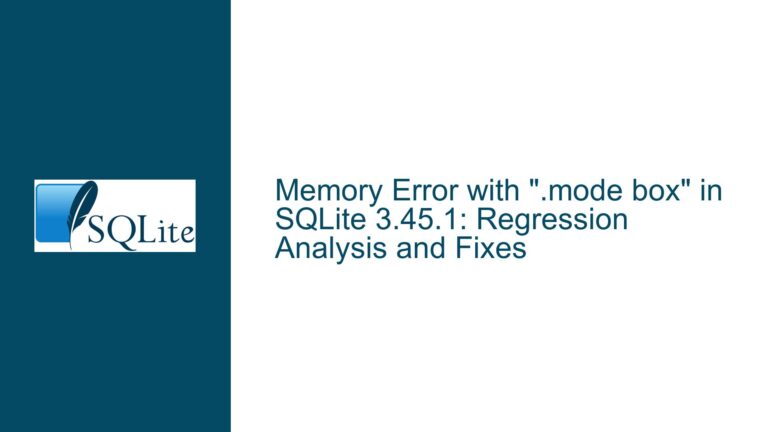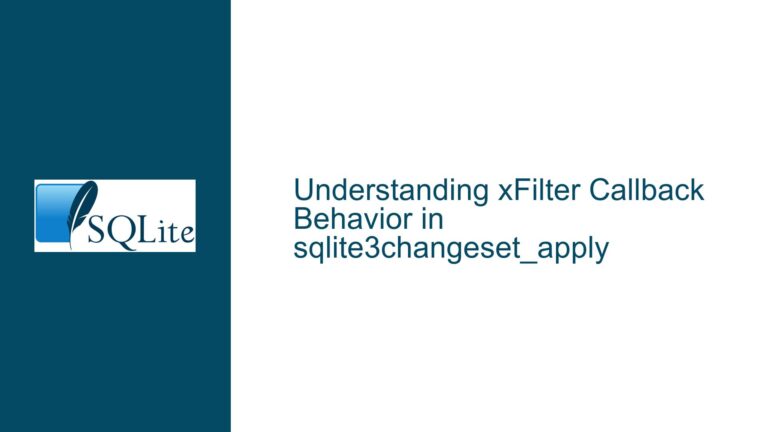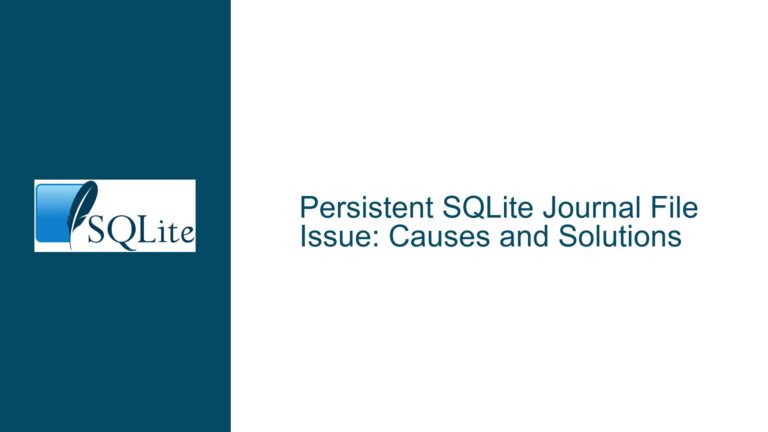Handling SQLite Prepared Statements and char* Lifetime in Multi-Threaded Applications
Understanding SQLite Prepared Statement Reuse in Serialized Mode
SQLite’s serialized mode allows multiple threads to use the same database connection simultaneously, but this does not inherently guarantee thread safety for all operations, particularly when reusing prepared statements across threads. Prepared statements, created using sqlite3_prepare_v2, are compiled SQL queries that can be executed multiple times with different parameters. In serialized mode, SQLite ensures that only one thread can execute a statement at a time, but this does not automatically resolve all concurrency issues.
When reusing prepared statements across threads, the primary concern is the management of the statement’s state. Functions like sqlite3_reset, sqlite3_clear_bindings, and sqlite3_bind_* are used to reset and rebind parameters for subsequent executions. However, the lifetime and validity of data returned by functions such as sqlite3_column_text are not extended by serialized mode. The char* pointer returned by sqlite3_column_text points to internal memory managed by SQLite, and this memory can be invalidated by subsequent operations on the same statement handle, even in serialized mode.
For example, if Thread A executes a prepared statement and retrieves a char* value using sqlite3_column_text, and then Thread B resets or re-executes the same statement, the memory pointed to by the char* in Thread A may be overwritten or freed. This behavior occurs because SQLite does not retain separate copies of result data for each thread when using the same statement handle. Serialized mode only ensures that operations are executed in a thread-safe manner, not that the underlying data remains valid across threads.
To avoid this issue, it is crucial to understand that serialized mode does not provide a mechanism for preserving the lifetime of result data across threads. Instead, developers must take additional steps to ensure that data retrieved from SQLite remains valid for the duration of its use in each thread.
The Lifetime of char* Values in Multi-Threaded SQLite Applications
The lifetime of char* values returned by sqlite3_column_text is a critical consideration in multi-threaded applications. When sqlite3_column_text is called, it returns a pointer to a string stored in SQLite’s internal memory. This memory is managed by SQLite and is subject to certain constraints that can affect its validity.
In a single-threaded application, the lifetime of the char* value is straightforward: it remains valid until the next call to sqlite3_step, sqlite3_reset, or sqlite3_finalize on the same statement handle. This is because these functions can cause SQLite to reuse or free the memory associated with the result set. However, in a multi-threaded application, the situation becomes more complex.
When multiple threads share the same prepared statement handle, the lifetime of char* values becomes unpredictable. If Thread A retrieves a char* value using sqlite3_column_text and then Thread B executes sqlite3_step or sqlite3_reset on the same statement handle, the memory pointed to by the char* in Thread A may be invalidated. This occurs because SQLite does not maintain separate copies of result data for each thread when using the same statement handle.
Even in serialized mode, which ensures that only one thread can execute a statement at a time, the internal memory management of SQLite does not extend the lifetime of char* values across threads. Serialized mode prevents concurrent execution of statements but does not provide a mechanism for preserving the validity of result data across threads. As a result, developers must assume that char* values are only valid within the context of a single sqlite3_step call and should not be relied upon after the statement handle is reused by another thread.
To address this issue, developers must either copy the char* values to thread-local storage or use separate statement handles for each thread. Copying the values ensures that each thread has its own independent copy of the data, while using separate statement handles prevents conflicts between threads.
Best Practices for Managing Prepared Statements and Result Data in Multi-Threaded SQLite Applications
To ensure thread safety and data integrity in multi-threaded SQLite applications, developers must adopt a set of best practices for managing prepared statements and result data. These practices include using separate database connections or statement handles for each thread, copying result data to thread-local storage, and avoiding the reuse of statement handles across threads.
Using Separate Database Connections or Statement Handles
One of the most effective ways to avoid conflicts between threads is to use separate database connections or statement handles for each thread. By giving each thread its own connection or statement handle, developers can ensure that the internal memory managed by SQLite is not shared between threads. This approach eliminates the risk of char* values being invalidated by operations in other threads.
When using separate database connections, each thread has its own independent connection to the database, and prepared statements are not shared between threads. This approach provides the highest level of isolation but may increase resource usage, as each connection requires its own set of resources.
Alternatively, developers can use separate statement handles for each thread while sharing a single database connection. This approach reduces resource usage compared to using separate connections but requires careful management of statement handles to ensure that they are not reused across threads.
Copying Result Data to Thread-Local Storage
Another approach to ensuring the validity of char* values is to copy the result data to thread-local storage immediately after retrieving it using sqlite3_column_text. By creating a copy of the data, developers can ensure that each thread has its own independent copy of the result data, which remains valid regardless of operations performed by other threads.
To copy the result data, developers can use functions such as strdup or memcpy to create a duplicate of the char* value. The duplicated data should then be stored in thread-local storage, such as a thread-specific variable or a dynamically allocated buffer. Once the data has been copied, the original char* value can be safely discarded, as it is no longer needed.
Avoiding the Reuse of Statement Handles Across Threads
Finally, developers should avoid reusing statement handles across threads whenever possible. While SQLite’s serialized mode allows multiple threads to share a single database connection, it does not provide a mechanism for preserving the validity of result data across threads. As a result, reusing statement handles across threads can lead to unpredictable behavior and data corruption.
Instead, developers should create and manage separate statement handles for each thread, ensuring that each thread has its own independent set of prepared statements. This approach eliminates the risk of conflicts between threads and ensures that the lifetime of char* values is predictable and manageable.
By following these best practices, developers can ensure that their multi-threaded SQLite applications are both thread-safe and efficient, avoiding common pitfalls related to the reuse of prepared statements and the lifetime of result data.
